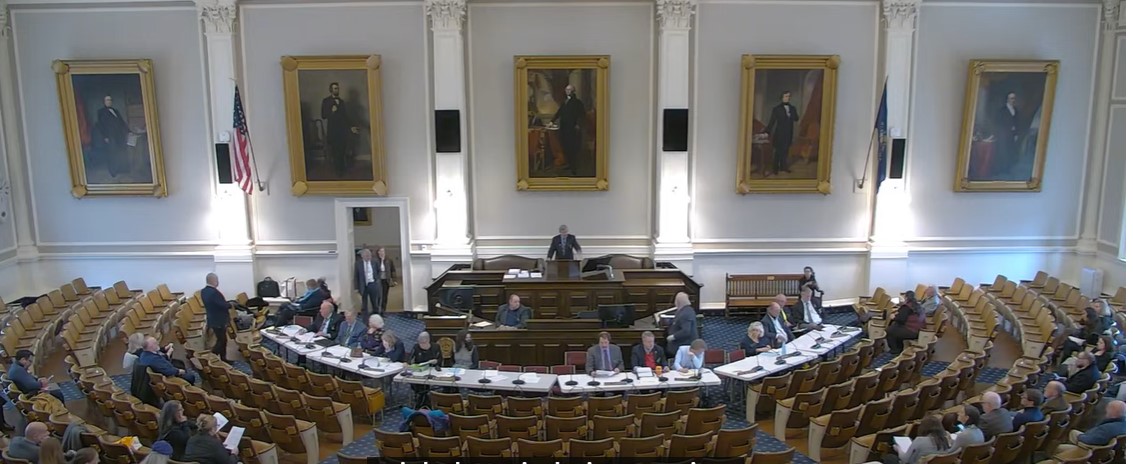By PAULA TRACY, InDepthNH.org
CONCORD – Supporters and opponents of the governor’s proposal to eliminate, consolidate or change many licensing boards in the state spoke out at a budget hearing Monday along with those who would like to see the governor’s proposed pay raises for all state employees and a 40 percent increase in private duty nursing rates for at-home care for the developmentally disabled.
Regulated midwives, landscape architects, stenographers, psychologists, podiatrists, nursing, naturopathic doctors, assessor, and acupuncturists, opposed House Bill 2, which Gov. Chris Sununu said would eliminate 692 “unnecessary statuatory provisions, 14 unnecessary regulatory boards, and 34 license types” as part of his budget.
Some boards would become advisory as well or consolidated when board members said they were working well and there was no need to change.
But representatives for Americans For Prosperity and the Josiah Bartlett Center for Public Policy supported the governor’s plan to reduce licensing boards saying it would help attract more people to come work here and reduce bureaucracy and unnecessary barriers to employment at a time when the state needs more workers.
Kate Hartwell, of the NH Midwifery Council, said the elimination of licensing “threatens every aspect of our profession including public safety.”
To make the board an advisory council and reduce the number from six to three would be consolidating power with the Office of Professional Licensure and that person does not have the expertise to make those decisions, she argued.
The House Executive Departments and Administration Committee voted Friday to oppose certain aspects of the governor’s licensing board proposal including seven boards and Chairman of the House Finance Committee, Ken Weyler, R-Kingston, assured that he felt that it was “unlikely” that his committee would recommend elimination of some, including those related to landscape architects and soil scientists.
Many others who came to the hearing on the governor’s budget proposal for the next two years spoke in support of Sununu’s proposal to increase funding for in-home support care for the disabled.
It took testimony in Representatives Hall for four hours and heard from more than 50 individuals whose remarks were kept to three minutes.
The House must act on the two budget bills by the end of the first week of April.
The Senate will have its own budget which may consider parts of the governor’s and the House’s budget. At the end of this process, it will likely be June when state spending is set for the state for the next two years.
Steve Ahnen, president and chief executive officer of the NH Hospital Association, called for higher Medicaid reimbursements to help in the mental health crisis.
He said the elimination of some of the licensing boards is “too much, too soon” and touched upon the recent federal court order related to boarding mental health patients, which sided with hospitals ordering the state to end the practice of boarding those in a mental health crisis in emergency rooms.
Ahnen said the governor’s trailer bill, House Bill 2 which would mandate mental health care at acute care hospitals “enshrines a broken system” in using hospitals to back up the state’s mental health problems.
He said when a patient is deemed to be a danger, by law he or she should be committed to the state’s mental health system. When the state eliminated 48 beds from the system last year, due to a staffing shortage at the State Hospital it exacerbated the problem, Ahnen said.
In part responding to Sununu’s claim last week that the hospitals are not playing as part of a team to solve the ER boarding crisis and should be “ashamed” that they instead went to court, Ahnen said New Hampshire’s various hospitals have been “eager to negotiate” but were left with no choice and went to court, which recognized the problem and has ordered the state and hospitals to come up with a timeline to resolve the issue.
The governor’s provisions to compel hospitals to assign beds to the mental health crisis “are wrong and should not be included” in House Bill 2, Ahnen said.
While the governor is proposing a number of measures to streamline and reduce costs, there were many licensed individuals who opposed the idea, particularly for merging boards.
Lindsay Courtney, director of the state’s Office of Professional Licensing and Certification listened to individuals speaking in opposition to the governor’s proposals which he claimed would make licensing more effective and efficient. She said what had not been heard is a broad overview. She noted that many of the boards have federal licensing already.
Will Walker, a father, asked for support for the governor’s disability budget noting that the need for increased funding was great.
Some spoke about the need to provide adequate funding for education and said Sununu’s budget proposal could be devastating to some poor schools in the long term, by eliminating the stabilization grants.
The governor’s plan calls for big pay raises for state employees as the state has a vacancy rate of about 20 percent.
The budget includes a 10 percent across-the-board pay increase on July 1 and another 2 percent increase on July 1, 2024.
Frank Campo, a state police sergeant speaking on behalf of the troopers association said the wage increases are essential as in the past few years the ranks have dwindled with many retirements and resignations. He said there has been a dramatic change since word of the intended pay increases has been made.
The governor’s budget also calls for $30 million to build up to 1,000 new housing units, $25 million for affordable housing, $10 million in initial funding for a new prison for men, $4.5 million for a computer science initiative for public schools and $27.9 million for wastewater state grant aid for New Hampshire municipalities.





